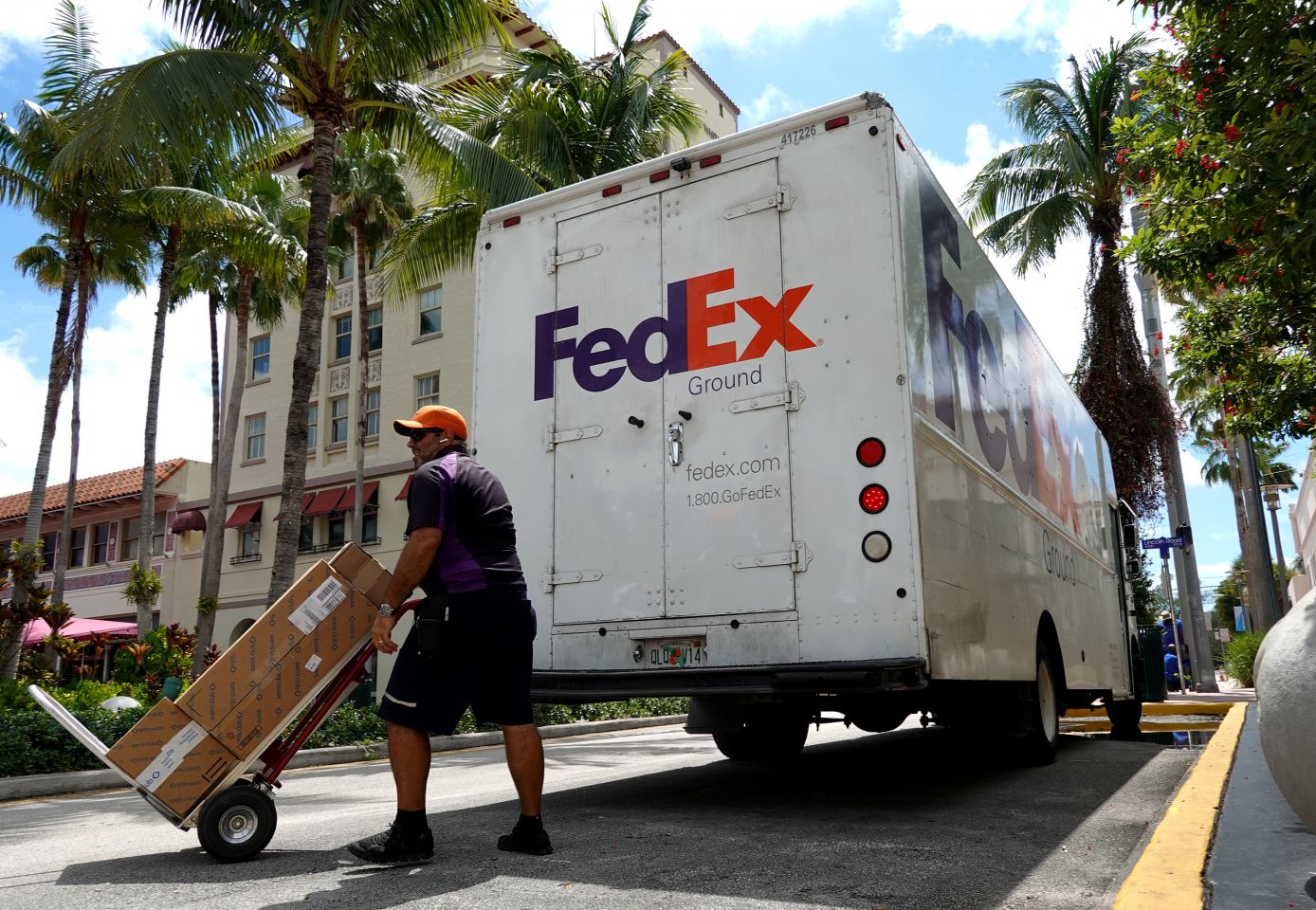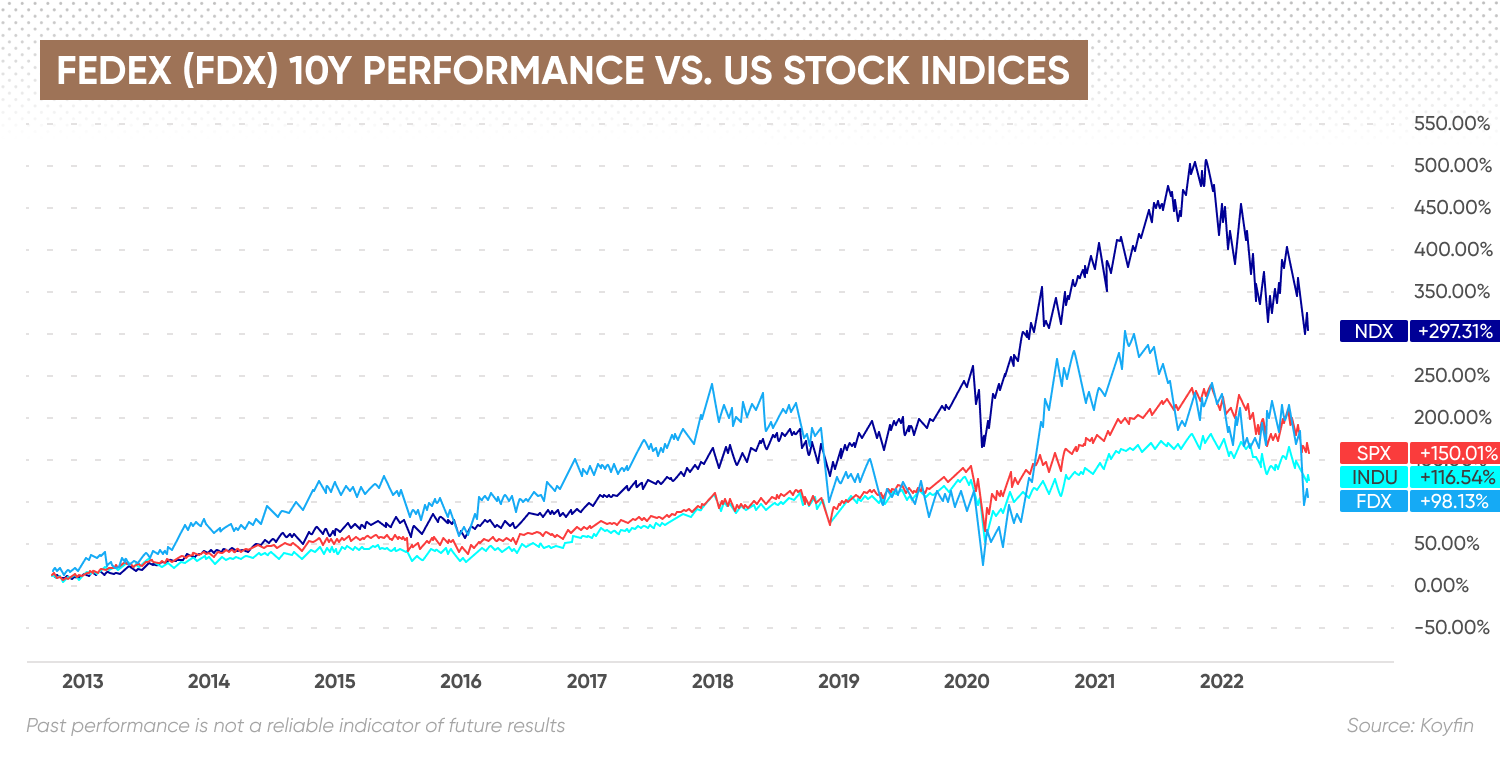FedEx activist investor: Logistics giant feels the heat from DE Shaw as FDX stock price slide leaves turnaround plan in tatters
FedEx stock suffered its worst daily fall in mid-September, and has lost over 40% year-to-date. What lies ahead for FDX as hedge fund D.E. Shaw puts pressure on the delivery giant? Read more in our overview.
FedEx (FDX) stock experienced its worst daily decline in several years on 16 September after the company provided a gloomy outlook for its business and withdrew its guidance for the 2023 fiscal year, citing fears that a global economic slowdown could be about to start.
In addition, the company’s governance will be influenced by activist investor D.E. Shaw as the hedge fund managed to secure two seats on the company’s board of directors and reserved a say in the appointment of a third one later.
The involvement of a FedEx activist investor could add pressure on the leadership team to step up and improve the business’s financial performance.
FDX stock has lost over 40% of its value year-to-date (YTD), dropping from $258 in early January to trade around the $155 mark, as of 12 October 2022.
In this article, we share further details about D.E. Shaw’s relationship with FedEx, what investors could expect from it, and what it could mean for the FDX stock price.
What is FedEx (FDX)?
FedEx is a multinational transportation conglomerate that provides ground, air and maritime logistics services. The firm was founded in 1971 by Frederick W. Smith. It commenced operations two years later with a fleet of 14 aircraft and nearly 400 team members.
Since then, FedEx has grown to become the 8th largest transportation business in the world by market capitalization. During the 2022 fiscal year, the firm delivered an average of 5.5 million packages a day, with roughly half in the United States.
During that same fiscal year, FedEx produced total revenues of $45.8bn and net income of $3.8bn. The company employs 550,000 people across the world to run its operations. Its CEO is Raj Subramaniam, who was appointed in March this year to replace the company’s founder.

FedEx was listed on the New York Stock Exchange (NYSE) in 1978 under the ticker symbol ‘FDX’. Its common stock was offered to the public at $24 a share.
In the past 10 years, the FedEx stock price has increased 98.1%. During that same period, the S&P 500 Index (US500) and the tech-heavy US Tech 100 Index (US100) delivered gains of 150% and 297.3%, respectively.
What is an activist investor?
Activist investors are either individuals or institutions that amass a stake in a public or private corporation to start influencing the leadership team, often by securing seats on the company’s board of directors.
These investors typically believe that the business could be better managed. They advocate for certain adjustments that may improve the company’s financial performance.
They will typically present proposals to the board and amass support from other leading shareholders to secure more seats or push for a change in the leadership team.
Other shareholders typically have a positive view of the involvement of activist investors, especially in public corporations, as long as their track record suggests that their activities on previous occasions have led to an improvement in the performance of the businesses they were involved in.
FedEx news: activist investor’s activities lead to board changes and dividend hike
D.E. Shaw is considered the most influential FedEx activist investor at the moment. The hedge fund has secured two seats on the board of directors with the appointment of Amy Lane and Jim Vena.
The investment fund reportedly owned approximately 1 million shares of FedEx by the end of March this year, making it the firm’s 35th largest stockholder.
Shaw was involved in Subramaniam’s appointment as the new CEO in March this year, replacing the firm’s founder Frederick Smith.
This FedEx activist investor is also pushing for an overhaul of the business in response to growing competition from UPS (UPS) and Amazon’s (AMZN) ambitious plans to compete with FedEx.
In June this year, FedEx officially announced the incorporation of two new board members, both Shaw’s picks, while the investment fund will reportedly participate in discussions that may lead to the appointment of a third director.
In addition to this, FedEx increased its dividend by 53% to $1.15 a share and aligned its executive compensation program with metrics that favour shareholders’ interests.
Subramaniam commented: “We appreciate the collaboration with the D. E. Shaw group, a long-time FedEx stockholder, with whom we have maintained an ongoing and constructive dialogue in reaching this agreement.”
On 4 October, FedEx also announced that it will ramp up its share repurchase program as it is now committed to buying back $1.5bn of common stock – approximately 7.9 million shares that will be taken out of circulation.
Moving forward, Shaw could put further pressure on the company’s newly-appointed CEO to improve the firm’s operating margins. One proposal in particular that investors have been favouring for years involves the combination of FedEx’s Ground and Express businesses to generate synergies.
According to the latest investor presentation published in June this year, FedEx aims to improve its adjusted operating margins to a range between 20% and 22% by the end of the 2025 fiscal year.
The company could share further details about its initiatives on 20 December when it publishes its financial results covering the second quarter of the 2023 fiscal year.
Analyst commentary about FedEx activist investor & FDX forecasts
“While the market may welcome today’s ‘shareholder friendly’ actions, in our view none of this addresses the real pressures facing the business”, commented Ravi Shanker, a Morgan Stanley (MS) analyst, when these actions were announced in June.
He added that competitive pressures for the transportation company “are intensifying” as Amazon’s plan to create a transportation unit could take a portion of FedEx’s market share.
Meanwhile, in regards to FedEx’s latest commentary on the company’s performance and the economic backdrop, Cowen analyst Helane Becker commented: “We suspect that headwinds from an inflation-fatigued U.S. economy, a resource-constrained European economy, and second-order effects from lockdowns in China proved too much to overcome.
Analysts from Credit Suisse (CS) commented: “We have noted high levels of investor skepticism directed at management's ability to reach its long-term targets. With earnings misses like this, that skepticism seems increasingly warranted.”
In this regard, the Swiss bank’s analysts noted that investors may be struggling to find answers to some “uncomfortable questions” about the feasibility of a large-scale reorganisation of the firm that can lead to “satisfactory financial results over the long-term”.
The consensus recommendation from analysts for FedEx stock stood at “moderate buy”, according to data compiled by MarketBeat. The average FedEx future stock price estimate stood at $214 a share, resulting in a 39.7% upside potential if that target is hit.
The bottom line
While knowledge about activist investor activity may provide important insight into a company’s performance, it shouldn’t be used as a substitute for your own research.
Always conduct your own due diligence looking at the fundamental and technical analysis, the latest news and a wide range of analyst commentary. Remember that past performance does not guarantee future returns. And never trade money you cannot afford to lose.
FAQs<
What is going on with FedEx in 2022?
FedEx went through a leadership change as its founder Frederick Smith stepped down from the CEO role and was replaced by Raj Subramaniam in March this year. In addition, D.E. Shaw, an activist investor that owns over 1 million shares in the transportation company, managed to influence the Board of Directors to increase the firm’s dividend payments and picked two individuals that were incorporated into the governance body.
Who owns FedEx?
According to data from GuruFocus, roughly 67.8% of FedEx stock is in the hands of institutional investors, including brokerage firms that act as custodians of the shares on behalf of their clients. The most prominent individual stockholder is Frederick Smith, the firm’s founder and former CEO, who owns 14.38 million shares, or 5.5% of the company’s outstanding stock.
Is FedEx a good stock to buy?
The FedEx stock value can be influenced by a wide range of factors, including macroeconomic variables, competition from companies such as Amazon and UPS, company-specific developments, and the evolution of the firm’s profit margins and bottom-line performance. Investors must analyse the fundamentals of the business and the price action of the stock to determine whether or not to invest in FDX.
Remember that analysts and algorithm-based projections can and do get their forecasts wrong. Always do your own research. And never invest more than you can afford to lose.